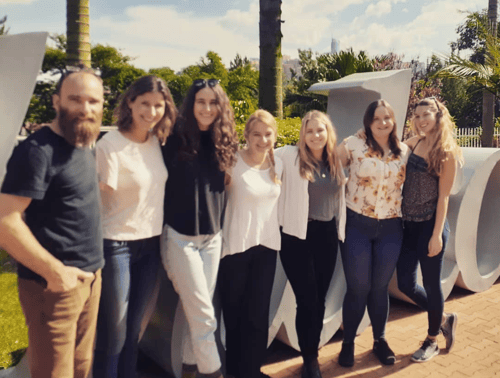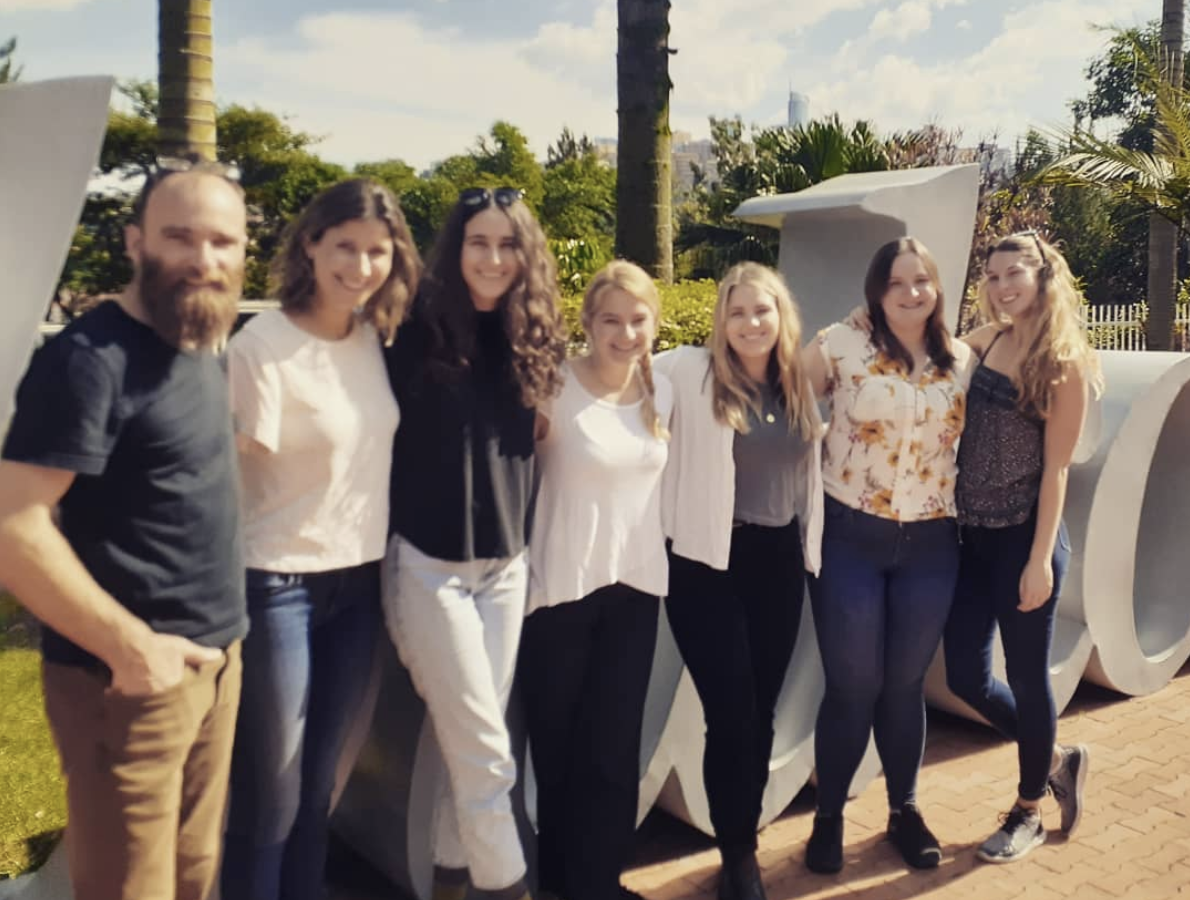Why Every Aspiring Peacebuilder Should Visit Rwanda
begin quote
 Kroc School students in Rwanda. Photo credit: Marissa Newman.
Kroc School students in Rwanda. Photo credit: Marissa Newman.
The following blog post was contributed by Master of Arts in Social Innovation student Rebecca Pollard.
If your childhood was anything like mine, you grew up seeing the entire continent of Africa as one far-away land mass filled with the most desolate poor. We grew up seeing desperate images on TV of skinny, sick children as the words in the background begged us to donate. If you do not know already, I’m here to assure you that these advertisements and well-meaning non-profits did everyone involved an absolute disservice.
When I told friends and family I was traveling to Rwanda for my Master of Arts in Social Innovation Practicum, I received the standard responses in our terribly misled society. “Why are you going there?” “It’s so dangerous… stay safe.” “Have you consulted with your doctor?” “Don’t go out at night, and only drink from closed beverages.” As a girl from New York I can say in confidence that the last message applies as far better advice in New York City than anywhere in Rwanda. However, far be it from popular opinion, the best way to unravel the toxic webs these images spun in our minds as children is to visit and see for ourselves. Any aspiring peacebuilder has masses to learn from Rwanda’s unique, not-so-far-away history and should have the experience of putting some of the most important peacebuilding skills to the test in their quickly blossoming society.
On day two in the beautiful, small country that is tucked in central East Africa, five of my colleagues and I had the surreal experience of walking through the Kigali Genocide Memorial museum of the Tutsi’s for “remembrance and learning” called Kwibuka25, meaning “remember” and recognizing the 25th anniversary of the genocide. It is the resting place for over 250,000 victims of the Genocide, providing survivors with a placid location to be with their lost ones.
Being 25 years old and walking through the history of a Genocide that happened during my lifetime came with indescribable emotions. Factor in what Rwanda looks like today and the strong sense of unity among its people, the current government and what it stands for, led to massive amounts of critical thinking and analysis. How did this war-torn country rise up so quickly and strongly? What is worth giving up to get to this place of peace? How do Rwanda’s today perceive their situations?
These thoughts led to the beginning of practicing important life skills every peacebuilder should have such as humble-inquiry, and human design-centered thinking. It was the first time I got to practice being aware of my foreignness in a very sensitive space, and got to feel out what is appropriate to ask while remaining respectful of people’s real-life tragedy. Being a humble academic in spaces where people’s lives were altered dramatically is a crucial skill that no one can teach you, but the guidance I received from Professor Austin Choi-Fitzpatrick was definitely appreciated as I found my way through this difficult endeavor for the first time.
On day three of our time in Rwanda, we got to see one of the most impressive operations I have ever gotten the opportunity to tour. The organization is called Zipline, and its mission statement on its website proudly announces “To provide every human on Earth with instant access to vital medical supplies.” As I write this, their number of “lifesaving deliveries by drone” is amassed at 27,812.
During our tour of the small facility we were told that the majority of deliveries consist of blood being sent to women who have hemorrhaged during birth. It is open seven days a week, and staff told us that they often come in after hours to send more life-saving deliveries. They currently reach 16,000,000 people with instant urgent medicines according to their website, and have operations in both Rwanda and Ghana. Seeing such an impactful social innovation living in a nation I grew up believing was in a state of constant desperate need was inspiring and perception changing. It pried my eyes open to the ignorance behind grouping an entire continent together because of a few sad images replayed with the same narrative. Coming to terms with one’s own perceptions, and being able to change them in a meaningful way, is another one of the most important takeaways I’ve gotten from this program.
 Photo Source: https://flyzipline.com/.
Photo Source: https://flyzipline.com/.
These images I grew up with about Africa go along with the original charity narrative that goes something like this: there are needy people out there, and you should feel guilty enough for your good fortune to donate to help them. The Kroc School of Peace Studies taught me during my first semester why this narrative is harmful for both the people giving and the ones receiving. In class we studied the shortcomings behind this charity-model method and how it can be done differently, in a more empowering and impactful way. However, as most of us can attest to, textbook learning and real-life experiencing are very different things. Being present in Rwanda and having the opportunity to visit one social enterprise after another demonstrated just how important updated methods of helping others to lift themselves into better circumstances, together, is. Rwanda has made huge strides in doing away with the traditional charity model and implementing methods that empower everyone involved. The effects of the many explorative social enterprises have been infectious in an incredibly positive way. Beyond meeting with multiple impressive social entrepreneurs, the energy in Kigali is buzzing with ideas, cooperation, unity, and budding businesses. Seeing “charity” done right in a setting I once thought of as a donation-drop was a crucial leap in my personal progress in becoming an effective peacebuilder.
In fact, all of these changes I was fortunate enough to experience in Rwanda were vital steps in my personal journey in striving to become a professional peacebuilder. Seeing classroom lessons come to life, touring innovations that were perception changing, and being able to put previously studied practices to the test were all opportunities that shoved me out of my comfort zone and into a safe place to try out all I had learned during the previous semester.
Ready to advance on your journey as a social innovator? Learn more about the Kroc School's Master of Arts in Social Innovation.
Contact:
Justin Prugh
jprugh@sandiego.edu
(619) 260-7573

About the Author
The Joan B. Kroc School of Peace Studies (Kroc School) at the University of San Diego is the global hub for peacebuilding and social innovation. Founded in 2007, the Kroc School equips the next generation of innovative changemakers to shape more peaceful and just societies. We offer master's degrees in peace and justice, social innovation, humanitarian action, conflict management and resolution, and a dual degree in peace and law — programs that have attracted diverse and dynamic students from more than 50 countries. In addition to our graduate programs, the Kroc School is home to the Kroc Institute for Peace and Justice (Kroc IPJ). Founded in 2001, the Institute supports positive change beyond the classroom. Through groundbreaking research, experiential learning, and forward-thinking programs, the Kroc School and Kroc IPJ are shaping a future in which peaceful co-existence is the new normal.






